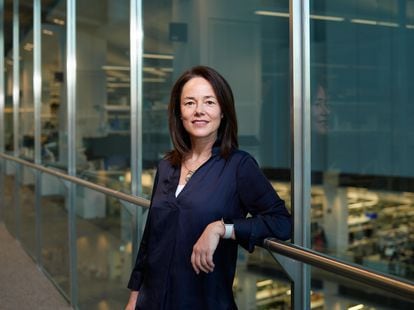Kathleen Folbigg at a hearing on her case in May 2019.Joel Carrett (AP)
Australia will review Kathleen Folbigg's conviction for a second time, the New South Wales Attorney General said today.
The case of the country's worst serial killer could become its biggest miscarriage of justice if it is proven that the deaths of Folbigg's four children were due to natural causes and not the actions of her mother.
This is what a team of scientists led by the Spanish immunologist Carola García Vinuesa has been trying to demonstrate for years.
Folbigg was sentenced in 2003 to 30 years in prison for the murder of three of her children and the homicide of a fourth.
The sentence was based on the extraordinary nature of the case, with four babies from the same family who died in their sleep over 10 years.
It was also supported by circumstantial evidence, such as ambiguous entries in Mrs. Folbigg's diary and the fact that she was the one who found the bodies.
But years later, a genetic investigation led by Dr. Vinuesa discovered that two of Folbigg's daughters had inherited a genetic mutation that could cause sudden infant death.
The other two children also suffered from illnesses that could have caused them to stop breathing in their sleep.
More information
This Spanish scientist wants to solve a genetic mystery and get a mother accused of killing her four children out of jail
The case has aroused the interest of the scientific community ever since.
Last year, a group of 90 scientists, including two Nobel laureates, called in an open letter for Folbigg's early release, arguing there was no medical evidence that he suffocated children.
“It was what we expected.
We are disappointed because we trusted that Folbigg would be released directly,” Vinuesa acknowledges by phone.
The attorney general of New South Wales, Mark Speakman, has ruled out this pardon in a statement, considering that "it was not appropriate" because the evidence "has to be proven."
Still, he believes there is enough doubt to warrant a second public inquiry.
"Things have changed a lot"
The first took place in 2019, when Vinuesa's team found the same mutation in the two Folbigg daughters.
They concluded that it was probably pathogenic.
This means that there is more than a 99% chance that it will cause heart disease leading to a fatal outcome.
At the time, the prosecution's scientific team disputed this study and considered the mutations to be irrelevant.
And the judge agreed with them.
"Things have changed a lot since then," says Vinuesa.
“Our research has been reviewed and different experiments have been done on it.
With which there is now stronger evidence than there was in the previous investigation, ”she says.
The immunologist Carola García de Vinuesa, at the Francis Crick Institute, in London.Michael Bowles |
Francis Crick Institute (Michael Bowles | Francis Crick Institute)
Folbigg has received the news with sadness and frustration, according to Vinuesa.
She but she is hopeful and grateful to the scientific community.
"He continues with the hope that this will be clarified," says the researcher.
“The only good thing is that if a very clear process is made, it can lead to an exoneration instead of a pardon.
It will serve to prove her innocence and take to the streets with the public more convinced of her innocence, ”she adds.
Convincing citizens will not be easy.
A part of the country wants to see behind bars who she was baptized by the media as “the most hated woman in Australia”.
The attorney general addresses them in his letter.
“I can well understand why part of the population shakes their heads and rolls their eyes in disbelief at how many opportunities Mrs. Folbigg has had to clear her name,” Speakman notes.
"But the evidence, in my opinion, clearly reaches the threshold necessary to open some kind of intervention."
For its part, Folbigg's legal team and part of the scientific community sees in this news the possibility of proving his innocence.
And to forever change the way science is presented in court.
Although those changes, Vinuesa regrets, could arrive two decades late for the condemned.
“We are talking about an innocent woman in a high security prison where she has spent almost 20 years.
And we don't know how much more has to happen.
From that point of view it is very tragic”, laments the scientist.
The previous public investigation stretched 11 months.
Folbigg has six years remaining on his sentence without parole.
You can follow
MATERIA
on
,
and
, or sign up here to receive
our weekly newsletter
.

